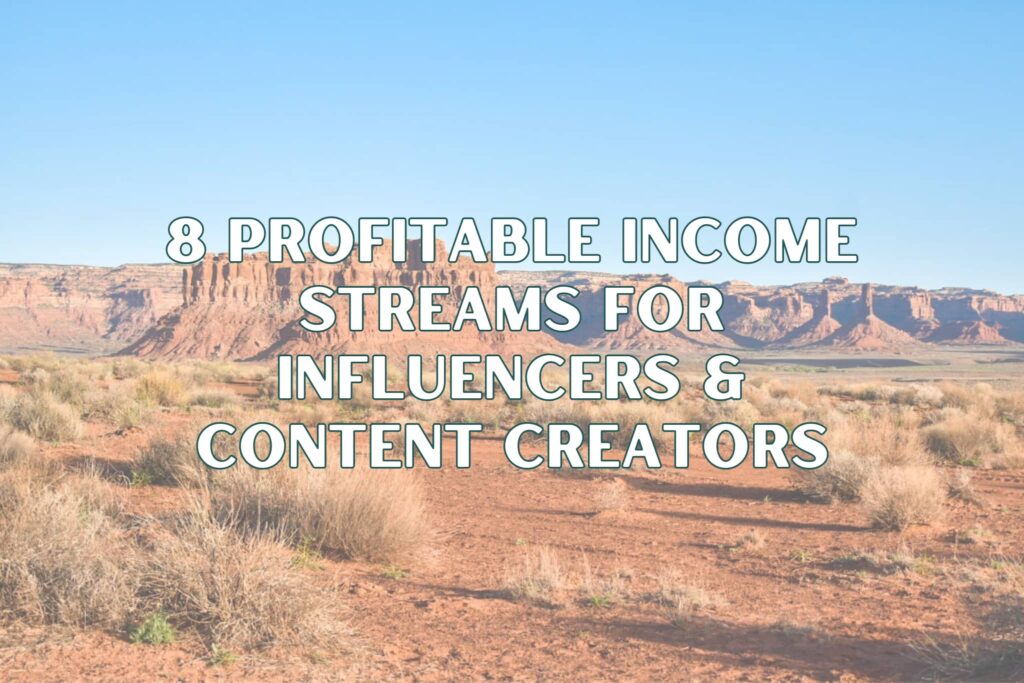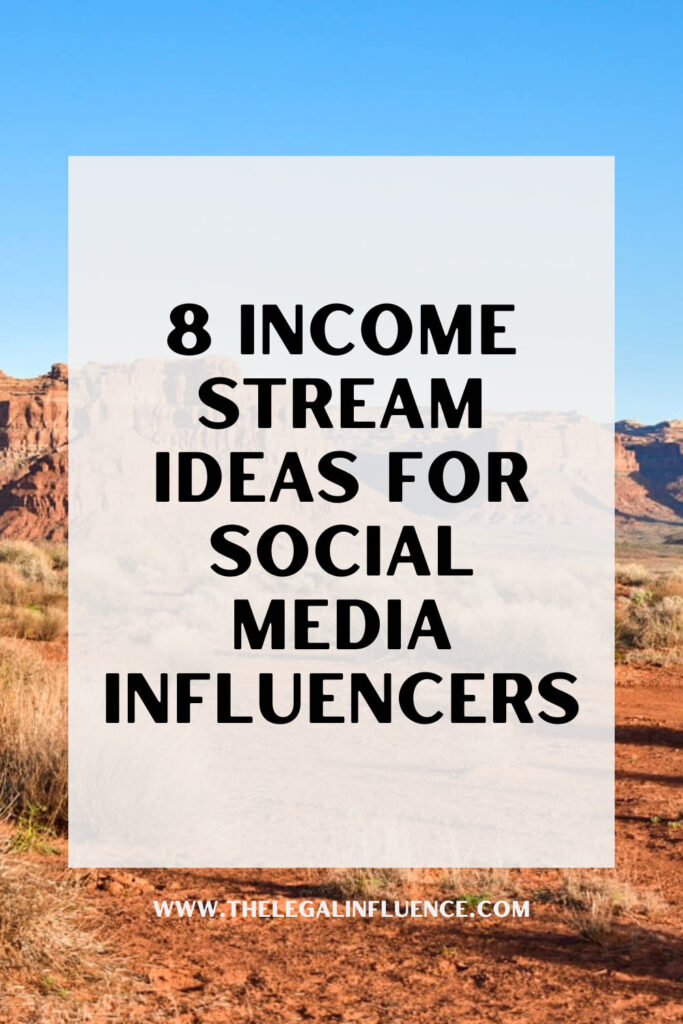The information contained in this “8 Profitable Income Streams for Influencers and Content Creators“ is for informational and educational purposes only. It is not to be construed as legal advice. Reading this article or relying on information from this article does not ever create an attorney-client relationship between you and Katherine Jaquith (aka Kate Cooper). Please speak with a licensed attorney for personalized business advice.
In the fast-paced world of social media, being an influencer or content creator isn’t about getting likes- it’s about building a sustainable business while making an impact in the world.
Today I’m sharing 8 income streams for influencers and content creators to help diversify your revenue in your influencer business. Owning an influencer or content creation business naturally lends itself to a variety of different streams of income. Whether you have 100 followers or 1,000,000 followers, you have options when it comes to making money as an influencer or content creator.
Keep in mind that not all of these income streams for influencers may make sense for your business. It would also be exceptionally difficult to implement all 8 at once even if you wanted to!
As you go through these 8 income stream ideas, keep your niche, skills, expertise, and experience in mind to help you determine whether an idea may be worth pursuing in your influencer business.

Income Streams For Influencers & Content Creators
1. Brand Partnerships
Brand partnerships are the cornerstone of most influencer businesses. A brand partnership at its core is a collaboration between an influencer and a brand. The terms of a brand partnership can vary, but typically the influencer is responsible for creating and sharing content about the brand on their social media channels.
Sponsored posts and brand partnerships are a great way to leverage your social media audience. Not only can they help boost your credibility as a creator, they can also introduce your audience to new brands and products they may love. If you have an audience on Instagram, TikTok, YouTube, Pinterest, or Facebook, brand partnerships are a great way to monetize those platforms.
Remember, authenticity is key when it comes to working with brands. Be sure to only partner with brands that you genuinely support and that align with your values. By doing so, you’ll maintain trust with your audience, and have better brand partnership outcomes.
The FTC requires you to disclose your relationship with a brand whenever you make an endorsement. This applies whether you’re being paid for your posts or you just received a product for free. Use language like #ad, #sponsored, or #BrandPartn ership to make the disclosure clear.
The FTC also requires that all statements made in social media marketing be true. This means that if you don’t like a product, you can’t make a statement saying that you do. This is another reason why only promoting brands and products you love is so important.

2. UGC Creation & Content Licensing
User-Generated Content (UGC) creation involves creating organic content for a brand to use on its social media or in marketing.
During a traditional UGC campaign you create content specifically for the brand’s use. You’re not responsible for posting the content on your social media accounts. You create the content and then you license the content to the brand. The details about the license you give to the brand will be outlined in your contract.
If you’re working with a brand as an influencer you can also license the content you create for the brand’s use. This requires you to negotiate usage rights during a brand partnership, which can significantly increase the value of a brand deal.
Licensing content is a fantastic way to enhance your brand partnerships as an influencer, while UGC creation is a great way to start working with brands if you don’t have an audience yet!
3. Affiliate Marketing
Affiliate marketing is a win-win for you and your audience. By sharing affiliate links, you earn a commission on sales generated through your recommendations. It’s easy to naturally integrate this income stream into organic content, whether you do product reviews, tutorials, or gear guides. If you’re already sharing products you love in blog posts or on social media, then affiliate links are a great opportunity to monetize that!
Many brands offer affiliate programs, which you can find in the footer of the brand’s website or by Googling “*brand* affiliate program.” There are also affiliate marketing platforms like LTK or Amazon where you can access a huge variety of products to link to. Affiliate links can be a nice passive income stream that rewards you for genuinely recommending products you love.
Hot Tip: Make sure to review the terms of your affiliate programs carefully so you know where you can post links and promote products!
Be aware that some brands have affiliate and brand ambassador programs that require you to purchase products or create content for the brand’s use. A legitimate affiliate program won’t cost you anything to join and shouldn’t come with any posting or content creation requirements.
Like brand partnerships, affiliate marketing requires making an FTC disclosure that lets your audience know you are sharing an affiliate link. Be sure to provide affiliate disclosures that can be seen before you share a link. The best practice is to include disclosures at the top of blog posts or with any links available.
4. Digital Products
Digital products open up a world of possibilities for influencers. If you have specialized knowledge or expertise, selling a digital product allows you to offer value to your audience while generating revenue for your business.
There are so many different types of digital products out there depending on your niche, including templates, guides, and ebooks (our DIY contract templates are an example of a digital product). Digital products are a fantastic opportunity to monetize your expertise, and provide your audience with valuable resources.
Here are some digital product ideas for different influencer niches:
- Recipe ebooks
- Fitness plans
- Travel guides
- Parenting ebooks
- Budgeting templates
Hot Tip: If you’re selling digital products online make sure you have clear Terms of Use that purchasers have to agree to in order to protect yourself legally!

5. Online Courses
If you’re an influencer looking to delve deeper into education, online courses can be a powerful income stream. An online course allows you to package your expertise into a series of lessons that guide your students towards some sort of transformation.
Courses can be more time consuming to create than a digital product, but you can often charge a higher price point than an ebook or guide. Online courses also provide a deeper level of education and transformation for your students.
For example, an online course about blogging will likely include information about how to start a blog, what platform you should use, how to set up your website, SEO basics, how to write a blog post, how to get readers, etc. While you could pack all that info into an ebook, a course is going to provide a much more tactile opportunity for students to put those lessons into practice.
You can use platforms like Kajabi, Teachable, and Thinkific to create a comprehensive online course.
6. Coaching or Professional Services
Offering coaching or professional services is a potential income stream for influencers with expertise on a specific topic. Whether you offer career coaching, fitness training, or consulting, working with clients one-on-one allows you to deliver individualized results to your clients.
Note that certain types of coaching or professional services require credentials. Services related to health, nutrition, legal, and financial services are heavily regulated, so ensure you comply with any legal requirements. I’m also not a fan of offering coaching services just to create an offer. This is an income stream that should only be pursued if you’re truly qualified to coach others.
The downside to offering coaching services is that you’re exchanging your time for money, so there’s a cap on the number of clients you can take on at any given time. However, depending on your experience and area of expertise, hourly rates for a coach can be quite attractive. The personalized nature of coaching also allows you to establish a deeper connection with your clients.
In addition to traditional coaching, you can also offer unique services that utilize your expertise. For example, if you’re a travel influencer you can create custom itineraries for people. If you’re a food blogger, you can offer local meal-prep services. If you’re a fashion influencer, you can create custom capsule wardrobes for people. Don’t be afraid to think out of the box when it comes to helping your audience!
Hot Tip: Make sure that you always have a contract when working with clients!

7. In-Person Events & Retreats
If you want to deepen your connection with your community, consider hosting in-person events or retreats. Not only do in-person events provide your audience with a unique opportunity to connect with you on a personal level, they can also be a profitable revenue stream. While they demand considerable effort to organize, the payoff in community engagement and loyalty can be unparalleled.
There are a lot of in-person events and retreats that you can curate depending on your audience’s travel preferences and interests. The beauty of hosting an in-person event or retreat is that you can be creative and create a one-of-a-kind experience for your community.
If you don’t have the bandwidth to put together your own event or retreat there are many companies out there that allow you to host group trips or retreats. Do some research to see what companies may be available in the areas you want to travel, and make sure to read the company’s policies and terms carefully to make sure they’re a good fit for your influencer business.
8. Merch
Creating branded merchandise gives your audience an opportunity to get a tangible piece of your brand. Whether you offer apparel, accessories, or unique items that align with your niche, merch can be an excellent way to build your brand while earning additional revenue.

Are You Ready to Create a Profitable Influencer Business?
I hope that these 8 income streams for influencers have your wheels turning about how you can diversify your revenue in your content creator business. Remember, not every income stream may be suitable for your brand and business. Consider your niche, skills, and the value each potential revenue stream adds to your brand. Stay true to your brand’s values. And make sure that every product or service you offer is aligned with your expertise.
To recap, here are the 8 income streams for influencers:
- Brand Partnerships
- UGC Creation & Licensing
- Affiliate Marketing
- Digital Products
- Online Courses
- Coaching or Professional Services
- In-Person Events & Retreats
- Merch
Pin It For Later:


View comments
+ Leave a comment